
Lotfi Aliasker Zadeh was a mathematician, computer scientist, electrical engineer, artificial intelligence researcher, and professor of computer science at the University of California, Berkeley. Zadeh is best known for proposing fuzzy mathematics, consisting of several fuzzy-related concepts: fuzzy sets, fuzzy logic, fuzzy algorithms, fuzzy semantics, fuzzy languages, fuzzy control, fuzzy systems, fuzzy probabilities, fuzzy events, and fuzzy information. Zadeh was a founding member of the Eurasian Academy.

Sankar Kumar Pal is a computer scientist and the president of the Indian Statistical Institute (ISI), Kolkata. He is also a National Science Chair, Government of India. Pal is a computer scientist with an international reputation on pattern recognition, image processing, fuzzy neural network, rough fuzzy hybridization, soft computing, granular mining, and machine intelligence. He pioneered the development of fuzzy set theory, and neuro-fuzzy and rough-fuzzy computing for uncertainty modelling with demonstration in pattern recognition, image processing, machine learning, knowledge-based systems and data mining. This has made him widely recognized across the world and made India a leader in these disciplines in international scenario. He founded the Machine Intelligence Unit in 1993, and the Center for Soft Computing Research: A National Facility in 2004, both at the ISI. In the process he has created many renowned scientists.

Anurag Kumar was the Director of the Indian Institute of Science at Bangalore, India from 2014–2020. He is a professor at the Department of Electrical Communication Engineering, and has served as the Chairperson of the Electrical Sciences Division at the Indian Institute of Science, before being appointed as the Director in 2014.
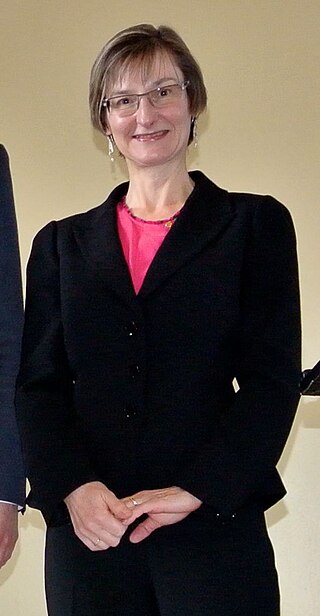
Dame Muffy Calder is a Canadian-born British computer scientist, Vice-Principal and Head of College of Science and Engineering, and Professor of Formal Methods at the University of Glasgow. From 2012 to 2015 she was Chief Scientific Advisor to the Scottish Government.
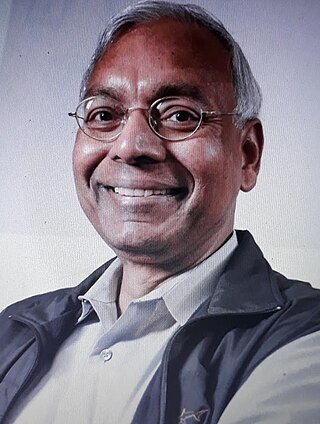
Anil Kumar Jain is an Indian-American computer scientist and University Distinguished Professor in the Department of Computer Science & Engineering at Michigan State University, known for his contributions in the fields of pattern recognition, computer vision and biometric recognition. He is among the top few most highly cited researchers in computer science and has received various high honors and recognitions from institutions such as ACM, IEEE, AAAS, IAPR, SPIE, the U.S. National Academy of Engineering, the Indian National Academy of Engineering and the Chinese Academy of Sciences.

Albert Y. Zomaya is currently the Chair Professor of High Performance Computing & Networking and Australian Research Council Professorial Fellow in the School of Information Technologies, The University of Sydney. He is also the Director of the Centre for Distributed and High Performance Computing. He is currently the Editor in Chief of IEEE Transactions on Sustainable Computing and Springer's Scalable Computing and Communications. He was past Editor in Chief of the IEEE Transactions on Computers.
Sanghamitra Bandyopadhyay is an Indian scientist specializing in computational biology. A professor at the Indian Statistical Institute, Kolkata, she is a Shanti Swarup Bhatnagar Prize winner in Engineering Science for 2010, IInfosys Prize 2017 laureate in the Engineering and Computer Science category and TWAS Prize winner for Engineering Sciences in 2018. Her research is mainly in the areas of evolutionary computation, pattern recognition, machine learning and bioinformatics. Since 1 August 2015, she has been the Director of the Indian Statistical Institute, and she would oversee the functioning of all five centres of Indian Statistical Institute located at Kolkata, Bangalore, Delhi, Chennai, and Tezpur besides several other Statistical Quality Control & Operation Research Units spread across India. She is the first woman Director of the Indian Statistical Institute. Currently she is on the Prime Ministers' Science, Technology and Innovation Advisory Council. In 2022 she was given the Padma Shri award for Science and Engineering by the Government of India.
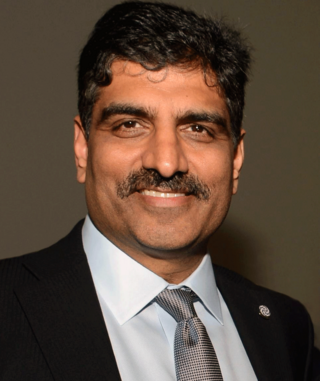
Venu Govindaraju is an Indian-American whose research interests are in the fields of document image analysis and biometrics. He presently serves as the Vice President for Research and Economic Development. He is a SUNY Distinguished Professor of Computer Science and Engineering, School of Engineering and Applied Sciences at the University at Buffalo, The State University of New York, Buffalo, NY, USA.
Debatosh Guha is an Indian researcher and educator. He is a Professor at the Institute of Radio Physics and Electronics at the Rajabazar Science College, University of Calcutta. He is an Adjunct faculty at the National Institute of Technology Jaipur and had also served Indian Institute of Technology Kharagpur as HAL Chair Professor for a period during 2015-2016.
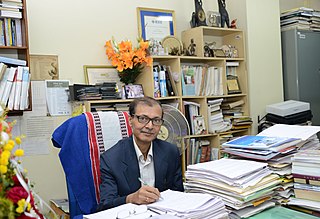
Bidyut Baran Chaudhuri is a senior computer scientist and the pro-vice-chancellor (academic) of Techno India University in West Bengal, India. He is also adjuncted to Indian Statistical Institute (ISI), where he was a professor for about three decades. He was the founding Head of Computer Vision and Pattern Recognition Unit of ISI. Moreover, he was a J.C. Bose Fellow and INAE Distinguished Professor at ISI.
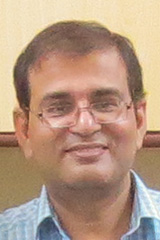
Subhasis Chaudhuri is an Indian electrical engineer and former director at the Indian Institute of Technology, Bombay. He is a former K. N. Bajaj Chair Professor of the Department of Electrical Engineering of IIT Bombay. He is known for his pioneering studies on computer vision and is an elected fellow of all the three major Indian science academies viz. the National Academy of Sciences, India, Indian Academy of Sciences, and Indian National Science Academy. He is also a fellow of Institute of Electrical and Electronics Engineers, and the Indian National Academy of Engineering. The Council of Scientific and Industrial Research, the apex agency of the Government of India for scientific research, awarded him the Shanti Swarup Bhatnagar Prize for Science and Technology, one of the highest Indian science awards, in 2004 for his contributions to Engineering Sciences.
Bayya Yegnanarayana is an INSA Senior Scientist at International Institute of Technology (IIT) Hyderabad, Telangana, India. He is an eminent professor and is known for his contributions in Digital Signal Processing, Speech Signal Processing, Artificial Neural Networks and related areas. He has guided about 39 PhD theses, 43 MS theses and 65 MTech projects. He was the General Chair for the international conference, INTERSPEECH 2018, held at Hyderabad. He also holds the positions as Distinguished Professor, IIT Hyderabad and an Adjunct Faculty, IIT Tirupati.
Dwijesh Kumar Dutta Majumder INSA was a Professor Emeritus in the Computer and Communication Sciences Division of the Indian Statistical Institute, Kolkata and Honorary Director-Secretary of the Institute of Cybernetics Systems and Information Technology in the same city. He is also an Emeritus Scientist of the Council of Scientific & Industrial Research, operated by the Government of India.
Andrew Fitzgibbon is an Irish researcher in computer vision. Since 2022, he has worked at Graphcore.

C. A. Murthy (1958–2018) was a senior scientist and higher academic grade Professor of the Indian Statistical Institute, whose primary research contributions were to the fields of pattern recognition, image processing, machine learning, neural networks, fractals, genetic algorithms, wavelets and data mining.
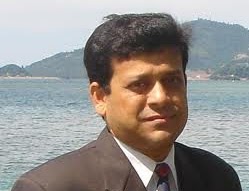
Ujjwal Maulik is an Indian computer scientist and educator. He is a professor and former head of the Department of Computer Science and Engineering at Jadavpur University, Kolkata, West Bengal, India. He has worked in many countries including India, US, Germany, France, Australia, China, Italy, Poland, Mexico, Slovenia and Hungary. He also held the position of the principal-in-charge and the head of the Department of Computer Science and Engineering at Kalyani Government Engineering College.
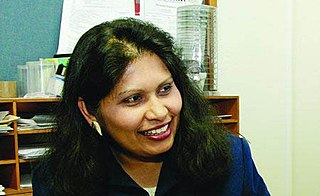
Sandhya Samarasinghe is a New Zealand engineering academic and currently a full professor at the Lincoln University.

The University College of Science, Technology and Agriculture are two of five main campuses of the University of Calcutta (CU). The college served as the cradle of Indian sciences by winning the Nobel Prize in Physics in 1930 and many fellowships of the Royal Society London.
Ludmila (Lucy) Ilieva Kuncheva is a Bulgarian-British computer scientist known for her research on pattern recognition and machine learning, and particularly on systems that combine results from multiple classifiers. She is professor in computer science at Bangor University in Wales.
Nikola Kirilov Kasabov also known as Nikola Kirilov Kassabov is a Bulgarian and New Zealand computer scientist, academic and author. He is a professor emeritus of Knowledge Engineering at Auckland University of Technology, Founding Director of the Knowledge Engineering and Discovery Research Institute (KEDRI), George Moore Chair of Data Analytics at Ulster University, as well as visiting professor at both the Institute for Information and Communication Technologies (IICT) at the Bulgarian Academy of Sciences and Dalian University in China. He is also the Founder and Director of Knowledge Engineering Consulting.













